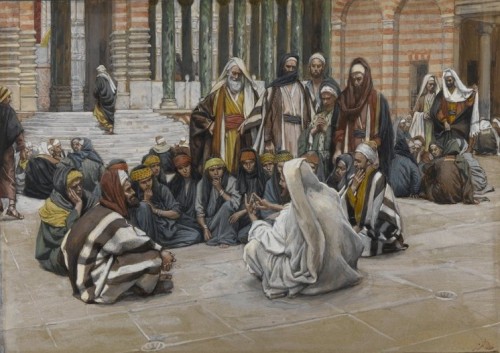DAILY MEDITATION: “Why do your disciples not follow the tradition of the elders?”
Liturgical day: Tuesday of the Fifth Week in Ordinary Time
 Gospel text (Mk 7,1-13): When the Pharisees with some scribes who had come from Jerusalem gathered around Jesus, they observed that some of his disciples ate their meals with unclean, that is, unwashed, hands. (For the Pharisees and, in fact, all Jews, do not eat without carefully washing their hands, keeping the tradition of the elders. And on coming from the marketplace they do not eat without purifying themselves. And there are many other things that they have traditionally observed, the purification of cups and jugs and kettles and beds.)
Gospel text (Mk 7,1-13): When the Pharisees with some scribes who had come from Jerusalem gathered around Jesus, they observed that some of his disciples ate their meals with unclean, that is, unwashed, hands. (For the Pharisees and, in fact, all Jews, do not eat without carefully washing their hands, keeping the tradition of the elders. And on coming from the marketplace they do not eat without purifying themselves. And there are many other things that they have traditionally observed, the purification of cups and jugs and kettles and beds.)
So the Pharisees and scribes questioned him, “Why do your disciples not follow the tradition of the elders but instead eat a meal with unclean hands?” He responded, “Well did Isaiah prophesy about you hypocrites, as it is written: This people honors me with their lips, but their hearts are far from me; In vain do they worship me, teaching as doctrines human precepts. You disregard God’s commandment but cling to human tradition.” He went on to say, “How well you have set aside the commandment of God in order to uphold your tradition! For Moses said, Honor your father and your mother, and Whoever curses father or mother shall die. Yet you say, ‘If someone says to father or mother, “Any support you might have had from me is qorban”’ (meaning, dedicated to God), you allow him to do nothing more for his father or mother. You nullify the word of God in favor of your tradition that you have handed on. And you do many such things.”
“Why do your disciples not follow the tradition of the elders?”
Fr. Iñaki BALLBÉ i Turu
(Terrassa, Barcelona, Spain)
Today, we are given to see how some late traditions of the Masters of the Law had actually manipulated the true meaning of the Fourth Commandment of God's Law. Those scribes taught that sons offering money and goods to the Temple were doing well. But, according to these teachings, parents could no longer ask or dispose of these goods. And the sons educated in such conscience were, thus, under the wrong impression of having certainly satisfied the demands of the Fourth Commandment. But, in fact, it was just a deception.
“How well you have set aside the commandment of God in order to uphold your tradition!” (Mk 7, 9): Jesus Christ is the authentic interpreter of divine Law; this is why He explained the right meaning of the Fourth Commandment, by undoing the sad mistake of their Jewish fanaticism.
“For Moses said, Honor your father and your mother” (Mk 7, 10): The Fourth Commandment reminds all sons and daughters the responsibilities they have with their parents. They have to help them, both morally and materially, to the best of their possibilities, during their aging days, and when they are facing times of illness, loneliness or anguish. Jesus points out quite clearly this duty of gratitude.
The respect towards our elders (filial piety) is made out of the gratitude they deserve for the gift they have given us, i.e., our life, and the sacrifices made for their children to grow up in age, wisdom and grace. “With your whole heart honor your father; your mother’s birth pangs do not forget. Remember, of these parents you were born; what can you give them for all they gave you?” (Sir 7.27-28).
The Lord honors the father in his children, and in them, also confirms the mother's right. “He who honors his father atones for sins; he obeys the Lord who brings comfort to his mother” (cf. Sir 3,2-6). These and other words of advice are a clear light for our life in relation to our parents. Let us ask our Lord the grace that we never lack the true love we owe our parents, and that we know how to transmit this sweet “obligation” to our neighbor by our example.
Source: evangeli.net

